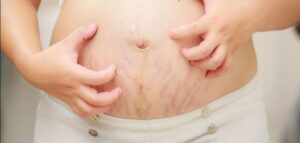April 20, 2020 | Black & Kletz Allergy
 Pruritic urticarial papules and plaques of pregnancy (PUPPP), also known as polymorphic eruption of pregnancy, is the most common skin disease of pregnancy. This polymorphic (i.e., different shapes and forms) skin eruption occurs in approximately 0.5% or 1 in 200 pregnancies. The cause of this condition is generally unknown.
Pruritic urticarial papules and plaques of pregnancy (PUPPP), also known as polymorphic eruption of pregnancy, is the most common skin disease of pregnancy. This polymorphic (i.e., different shapes and forms) skin eruption occurs in approximately 0.5% or 1 in 200 pregnancies. The cause of this condition is generally unknown.
Individuals with this condition exhibit a very itchy (i.e., pruritus) rash that usually begins in the last trimester, but can began earlier in the pregnancy. The rash usually begins in stretch marks on the abdomen, but spares the area around the umbilicus (i.e., belly button) and within a few days begins to spread to the legs, feet, arms, neck, and/or chest. It tends to spare the face, palms, and soles. Skin distension (i.e., stretching) is thought to be a possible trigger for this condition.
It is more common to occur in a first pregnancy than in subsequent pregnancies. Likewise, it is more common to occur in pregnant women who are carrying a male fetus, pregnant with multiple births (e.g., triplets more than twins), and/or who have gained excessive weight during their pregnancy.
Initially the rash presents as red, hive-like (i.e., urticarial) bumps (i.e., papules) and later may develop into larger red, swollen patches (i.e., plaques). In lighter-skinned individuals, the rash may appear to be surrounded by a thin, white halo.
CAUSES:
The exact cause of pruritic urticarial papules and plaques of pregnancy is not exactly known.
One theory hypothesizes that when the skin of a pregnant woman is stressed or stretched, the connective tissues can be damaged. This damage causes inflammation which can result in a red, swollen rash.
Another theory of the cause of PUPPP is that it is due to an immune response to fetal cells. During pregnancy, some cells from the fetus migrate throughout the mother’s body. It is these fetal cells that can trigger an immune response in the mother, which in turn causes the rash.
DIAGNOSIS:
The diagnosis is usually established by the history and appearance of the rash and its association with intense itching. There are no specific diagnostic tests and skin biopsy usually reveals non-specific findings. A skin biopsy is sometimes done in order to differentiate the rash from similar rashes caused by herpes gestationis, prurigo of pregnancy, and atopic dermatitis (i.e., eczema).
Rarely, the baby can be born with a mild form of the rash of pruritic urticarial papules and plaques of pregnancy, but this rash soon fades. It should be noted that PUPPP does not cause any other problem for the baby.
TREATMENT:
Pruritic urticarial papules and plaques of pregnancy continues until delivery then usually resolves within 1–3 weeks. Rarely, it may persist for longer. In some cases, this relates to retained placental products.
There is no curative treatment for PUPPP, apart from delivery. Symptoms can be controlled using the following:
⦁ Emollients (i.e., moisturizers) applied liberally and frequently as required
⦁ Topical steroids applied thinly once or twice daily to the red itchy patches
⦁ A short course of systemic steroids (e.g., prednisone) in severe PUPPP
⦁ Antihistamine tablets appear safe in late pregnancy, although they may make the baby drowsy upon delivery
It is very uncommon for pruritic urticarial papules and plaques of pregnancy to recur. If it recurs, it is likely to be a milder case. It should also be noted that there is no long-term risk for either the mother or unborn child despite frequently severe itching.
The board certified allergists at Black and Kletz Allergy have over 5 decades of experience in diagnosing and treating all types of allergic skin conditions. We treat both pediatric and adult patients, and of course pregnant patients. Black & Kletz Allergy has 3 convenient locations with on-site parking located in Washington, DC, McLean, VA (Tysons Corner, VA), and Manassas, VA. The Washington, DC and McLean, VA offices are Metro accessible and we offer a free shuttle that runs between the McLean, VA office and the Spring Hill metro station on the silver line. To schedule an appointment, please call any of our offices or you may click Request an Appointment and we will respond within 24 hours by the next business day. We have been servicing the Washington, DC, Maryland, and Northern Virginia metropolitan area for many years and we look forward to providing you with the utmost state-of-the-art allergy care in a warm and pleasant environment.












